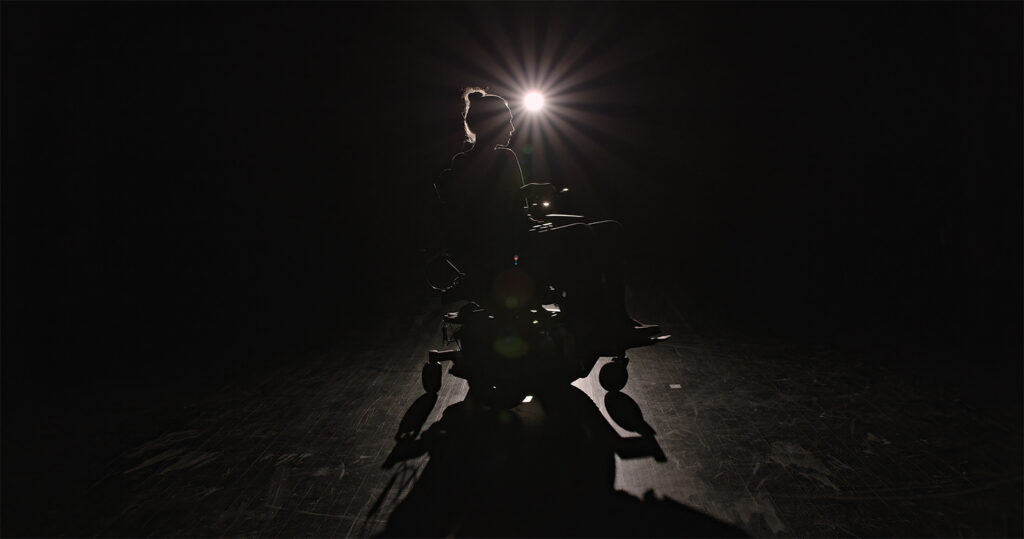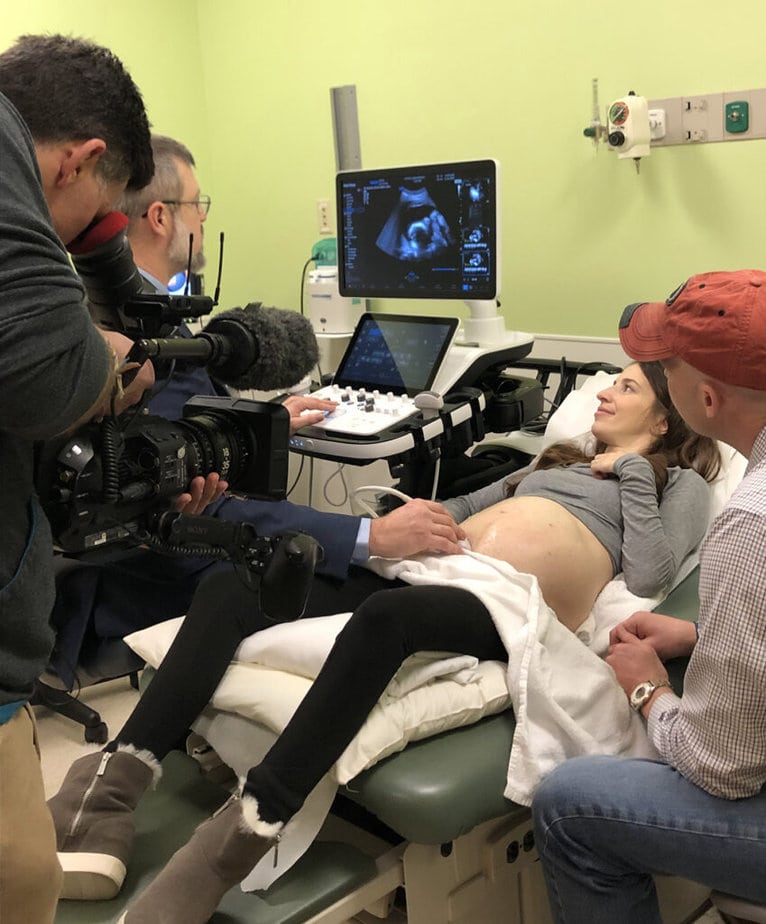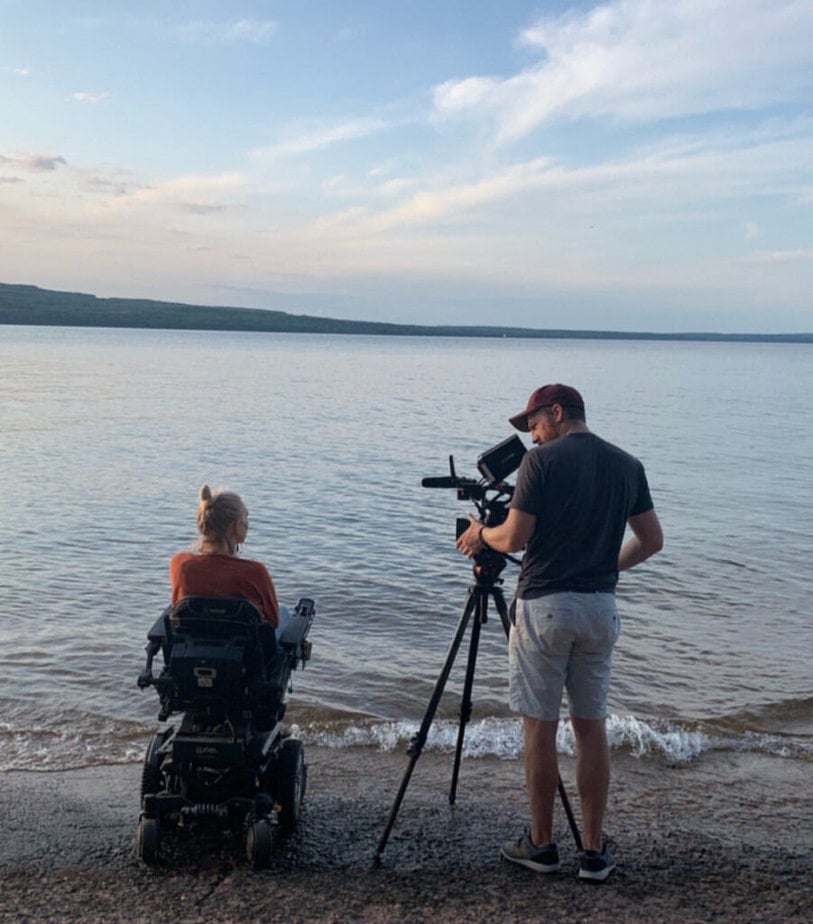Behind the Lens
Wheelchair Users Tell Their Stories in Acclaimed Documentaries
July 1, 2023
Steve Wright
A growing number of wheelchair users are getting behind the camera and creating documentaries that are airing on PBS, winning at film festivals and even earning Oscar nominations.
New, more affordable technology, expanding media outlets and a content-craving public are a few of the reasons why documentary filmmaking has become more accessible than ever. We spoke to three wheelchair-using filmmakers with varying degrees of experience who aim to entertain, educate the masses, and motivate others with disabilities to tell their stories and bust myths held by nondisabled viewers. Disclaimer: No cringeworthy inspiration porn was created in the making of these films.
Dani Izzie, Producer, Dani’s Twins
Dani Izzie knew there was an audience for her story and genuinely believed others could benefit from seeing it documented on film, but she also knew how easily it all could go wrong. “I have a sensational story, like the greatest clickbait: ‘Quadriplegic woman gives birth to twins,’” she says. “But I don’t want it to be sensationalistic. I want to combat the bias against women with disabilities becoming parents. … We have to break through this ableism.”
Izzie, a C5-6 quadriplegic, had been approached by a casting director of reality TV shows and offered a handsome sum of money to document her pregnancy in exchange for relinquishing the exclusive rights.

“They are my children. I want some ownership. You can’t just buy me,” she says, explaining why she rejected the offer. “There was no guarantee that they were going to get the disability narrative right. I was worrying, from what I’ve seen on TV and film, they were going to really fuck it up.”
Izzie held out before eventually deciding to make Dani’s Twins with a filmmaker known for documentaries with a social impact. It helped that he was a personal friend and promised her the freedom to tell her story her way.
As Izzie’s pregnancy progressed, cinematographers began filming her and her husband, Rudy, in their Virginia home. Then came Covid. No one wanted to travel, and no one wanted to expose Izzie to increased health risks during her pregnancy. “The pros did a shoot before my baby shower, then everything shut down. It was in the middle of the pandemic. We couldn’t even do fundraising,” she says.
Because there’s no pause button on pregnancy, Izzie and her husband became the camera crew, using smartphones and a digital camera. Izzie evolved from being the subject of the film to its producer.
Despite having no experience as a filmmaker, the change came naturally to her. Being behind the camera made it even easier for Izzie to ensure her story emphasized the normalcy of living life with a disability and avoid the “overcoming all odds” storyline that nondisabled filmmakers fixate on in movies about disability.
“I focus on concrete solutions and figure it out like any other new parent,” she says. “With a spinal cord injury, I honestly think it makes me a stronger parent. I know how to prepare for massive challenges. What matters is what you can give your children emotionally, physically and mentally.”
The 40-minute film tackles many issues unique to disability and pregnancy, while also covering hospital trips, the pandemic and, of course, the eventual birth of Izzie’s two healthy girls, Lavinia and Giorgiana. It premiered in May 2022 at Mountainfilm Festival in Telluride, Colorado, and has been on the film festival circuit while the team searches for a distributor.
Izzie encourages people with disabilities to try documentary-making. She says the key is to reach out to people in the industry, ask questions and start telling your story. She hopes that the film, and her prominent role in making it, will help educate others. “I did this to amplify disabled parenting,” she says. “Pregnant disabled women are subject to hate speech. A lot of times people are judgmental or biased against people with disabilities having kids.”
Kelsey Peterson, Co-Director, Move Me

Kelsey Peterson’s full-length documentary, Move Me, provides a candid look at a number of raw subjects: her father’s terminal illness, his struggles with her C6 spinal cord injury, her research into invasive but possibly life-enhancing medical procedures, and her choreographing and performing in a dance project for the stage.
Through sweat, tears and a lot of earthy language, the film moves between all of these topics while also exploring Peterson’s evolving relationship with her own disability. Since being released in fall 2022, the film has played at eight film festivals and aired as part of PBS’ prestigious Independent Lens series. These are heady accomplishments for a first-time co-director, and even more so when you consider how different the final product is from what Peterson started in 2017.
“I had no intention of making this film. I filmed some of it, then saw the footage wasn’t good enough and realized that I needed production professionals to tell the story,” she says. After a rotating series of assistant filmmakers and do-it-yourself filming funded by Kickstarter contributions, she eventually brought on award-winning co-director/producer Daniel Klein. She credits Klein for creating a “container of trust” that allowed her to be her vulnerable, truest self.
“My story is about self-discovery. It’s a wild thing to discover that while you’re in a wheelchair, you still have internalized ableism from our culture.”
The team applied to an open call for documentary submissions from nonprofit Independent Television Services and received $350,000 in funding plus a pipeline to PBS. ITVS funds and presents documentaries on public television, new media projects on the internet, and the weekly Independent Lens on PBS. Peterson said the support from ITVS turned her project from a personal endeavor to a high-caliber film.
Filming the documentary helped Peterson rediscover the internal artist and storyteller she had lost post-SCI. She was a successful dancer prior to her injury and loved expressing herself through dance. She says her “internalized ableism” made it difficult for her to see herself as a dancer after her injury.
“The artist in me came out in documentary form, and it felt like a reblooming of myself. I could feel it in post-production and the editing room. This beautiful unraveling. Being able to translate myself.”
Listening to Peterson discuss the filmmaking process, it’s clear the experience had a profound effect on her. “When I started, I wasn’t even comfortable with the word ‘disability,’ or claiming it,” she says. “I learned the importance of storytelling for your own personal growth.”
Peterson advises would-be documentarians in the disability community to “be brave” and reach out to experts in production, funding and broadcasting. She suggests working with grant writers, or at least finding multiple good editors to review grant applications and deliver quality feedback. “Fundraising is challenging enough as it is, and you don’t want to put in all this effort and wish that you could’ve done more, or feel like you wasted your time,” she says.
Peterson’s film happened so organically that, looking back, she wouldn’t do much of anything differently. “My story is about self-discovery. It’s a wild thing to discover that while you’re in a wheelchair, you still have internalized ableism from our culture,” she says. “I love my body,” she adds. “I don’t need to be fixed. But I’m really interested in possible recovery and if it could give me different kinds of pleasure or give me more time.”
James LeBrecht, Co-Director, Crip Camp
If there was a Mount Rushmore of disabled filmmakers, James LeBrecht would be on it. The longtime disability rights activist and founder of Berkeley Sound Artists has done sound design work for over 145 films — including as re-recording mixer for Move Me — with a particular focus on documentaries. The New York native, who has spina bifida, co-directed Crip Camp, the award-winning 2020 documentary about the birth of the disability rights movement.
LeBrecht’s passion for film and documentaries inspired him to co-found Filmmakers with Disabilities — Documentary, a nonprofit that seeks to increase visibility, support, access and opportunities for deaf, disabled and neurodiverse filmmakers. FWD-Doc is modeled after successful startup film advocacy groups launched by and for women of color.
LeBrecht said that FWD-Doc, funded by the Ford Foundation, Perspective Fund, Field of Vision and Jonathan Logan Family Foundation, has created a private database of people with disabilities who work in many aspects of filmmaking. The database allows productions that want to be inclusive to get referrals for hiring industry professionals. In association with filmmaking nonprofit Doc Society and supported by Netflix, FWD-Doc published “A Toolkit for Inclusion & Accessibility: Changing the Narrative of Disability in Documentary Film,” available as a free download on its website.

FWD-Doc is also thinking beyond the filmmaking process, pushing for more accessibility at film festivals, from screening facilities to after-parties. LeBrecht notes that deals for financing, distribution and collaboration get done at festivals, and if they are not accessible to all, the playing field is not level for disabled documentary makers. To this end, FWD-Doc created a Film Event Accessibility Scorecard, a handy checklist to steer film festivals away from private screenings that are inaccessible, or after-parties held at lounges that are downstairs, upstairs or are otherwise inaccessible.
With personal memories of how things were, he appreciates the progress the industry has made on including people with disabilities. “Thank goodness there are easier entry points than there were 30 years ago. Being able to use an iPhone, being able to do a podcast, being able to do edits — the price points are much lower than they used to be,”
he says.
Obstacles remain when it comes to disabled technical talent progressing on the film career ladder. “Entry-level positions in film are on-set production assistant(s). If you don’t have endurance and agility, it is an absolute deal breaker. The attitude is ‘if you’re not willing to sleep under your desk, I don’t want you here because you’re not dedicated.’ That kind of pressure will kill people,” LeBrecht says. “Only wanting people who can do a coffee run for 12 people and work 10 days straight — that’s impossible for a single parent, for economically disadvantaged people — it’s bullshit. It has nothing to do with your true value.”
LeBrecht wishes more industry leaders appreciated the value people with disabilities bring to their work. “As a person with a disability, if I limit my time, it’s not limiting my creativity,” he says. “I can manage time really well. The industry has to change to create openings for all people with imagination and dedication and creativity.”
Knowing that Crip Camp’s success opened doors, LeBrecht has leveraged his renown to grow FWD-Doc. By partnering with companies like NBCUniversal, he hopes to keep the industry headed in the right direction.
“NBCUniversal is trying to develop some shows about disability. We’re working with them and trying to get studies to understand that disability is a part of diversity, equity and inclusion — that you must add an A for ‘Access’ to DEI,” LeBrecht says. “Because mainstream films still have a hard time seeing beyond the tropes, I think there is a great need for independent films made by people with disabilities. You simply have to tell your story from an authentic viewpoint.”
Resources
Dani’s Twins: danistwinsfilm.com, IG: DanisTwinsFilm
Move Me: movemedoc.com, IG: movememovie
Crip Camp: cripcamp.com, IG: CripCampFilm
FWD-Doc: fwd-doc.org, IG: FwdDoc
Support New MobilityWait! Before you wander off to other parts of the internet, please consider supporting New Mobility. For more than three decades, New Mobility has published groundbreaking content for active wheelchair users. We share practical advice from wheelchair users across the country, review life-changing technology and demand equity in healthcare, travel and all facets of life. But none of this is cheap, easy or profitable. Your support helps us give wheelchair users the resources to build a fulfilling life. |

